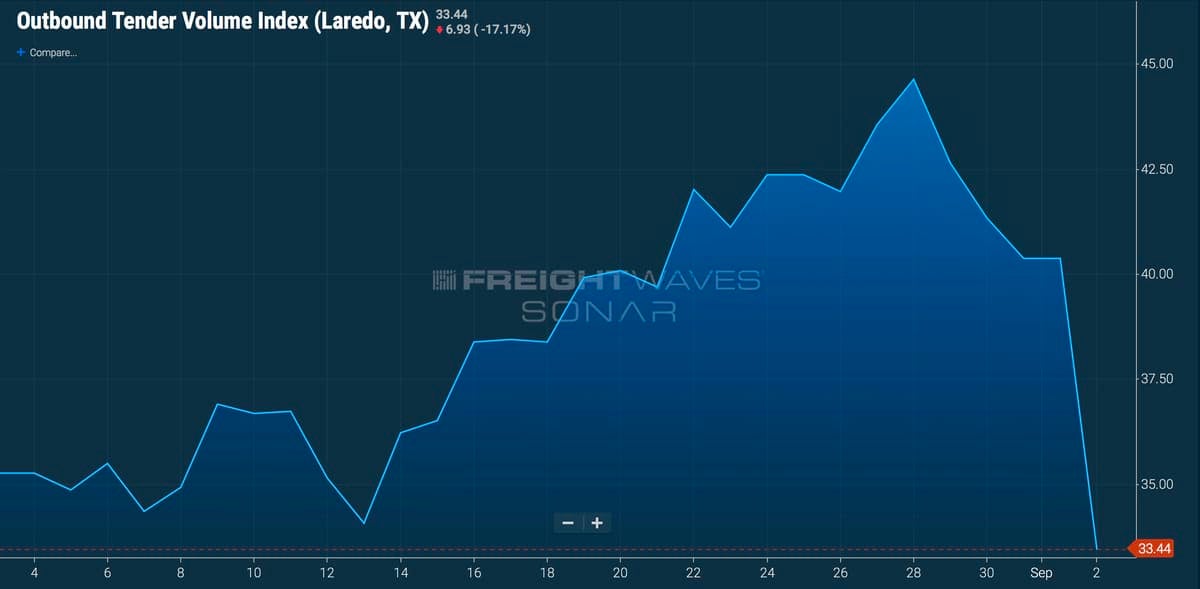Cross-border truck freight with Mexico dipped 1 percent in June, compared to the same period in 2018, according to recent data from the U.S. Department of Transportation’s Bureau of Transportation Statistics released last week.
The new data reported that trans-border trucks carried freight totaling $66 billion for the month of June, with trucks accounting for 63 percent of all freight between the U.S., Mexico, and Canada.
The top three truck commodities (52 percent of total trans-border truck freight) were computers and parts ($13.5 billion); motor vehicles and parts ($10.4 billion); and electrical machinery ($10 billion).
Trans-border truck freight between the United States and Mexico totaled $36 billion (70 percent of all southern border freight) for the month of June, declining around 1 percent compared to the same time last year.
In May, truck freight volume was up 4.3 percent along the U.S.-Mexico border, compared to the same period a year ago.
The three busiest truck border ports (46 percent of total trans-border truck freight) were Laredo ($15.2 billion), Detroit ($9.4 billion) and El Paso ($5.5 billion).
At Port Laredo, trans-border truck trade declined from $16.3 billion in May to $15.2 billion in June. The Port of El Paso also dipped from $5.9 billion in May to $5.5 billion in June.
Trade experts said that President Donald Trump’s ongoing dispute with China’s president, Xi Jinping, over tariffs could have a negative effect on ports like Laredo, El Paso and others that rely on daily freight trade.
Although the U.S.-China trade dispute has been ongoing for months, on August 23 President Trump called Jinping an “enemy” and said he would raise tariffs on an additional $300 billion of products from China. Trump also “hereby ordered” U.S. businesses to leave China.
“I definitely think the tariff threat had a dampening effect on trade, but once that got resolved, Mexico has started to surge and is now the U.S.’s largest trading partner,” said Kenneth Smith Ramos, former chief negotiator for the United States-Mexico-Canada Agreement for the government of Mexico.
The Outbound Tender Volume Index (SONAR: OTVI.LRD) in Laredo recently increased 6.5 percent from August 26 to August 28; then the index dropped 9.48 percent from August 28 to September 2. This information comes from the FreightWaves SONAR platform.

The spike in volume was most likely due to the Labor Day weekend, as importers worked to get freight/goods produced in Mexico into the U.S. before the holiday.
Ramos, who is also a partner at Mexico-City based Agon, Economía, Derecho, Estrategia, said that U.S.-Mexico trade should remain strong, “however, in the long-run, the trade war between the U.S. and China can have a negative impact on the U.S. economy and that would hurt Mexico’s exports since we are so integrated with the U.S.”
An example could be tomatoes, a longtime powerhouse product that has been one of the drivers of business at ports of entries such as Nogales, Laredo and McAllen. However, Trump’s tomato dumping investigation against Mexico and subsequent tariffs hurt imports.
The U.S. imports more than 80 percent of its fresh tomatoes from Mexico, and more than 50 percent of Mexican tomatoes come through Texas.
Imports of tomatoes rose 5.44 percent at Port Laredo compared to last year to $286.85 million.
However, imports of fresh tomatoes at McAllen’s Pharr-Reynosa International Bridge along the U.S.-Mexico border declined more than 11 percent compared to last year for the month of June to $264.54 million.
“About 41 percent are shipped through Pharr and another 11 percent through Laredo,” Luis Ribera, Texas A&M AgriLife Extension Service economist in a release. “This could impact the 8,000 jobs here in Texas that support fresh produce imports from Mexico. This would include everything from packers, brokers, transportation, anything and everything that supports this important industry that gets tomatoes from market to the retailer.”
Imports from Mexico that declined in June at Port Laredo included computers, which fell 16.28 percent (to $2.7 billion) compared to last year.
In addition to truck freight, Laredo was also the busiest rail port along the U.S.-Mexico border with $3.8 billion in goods in June crossing both ways (53 percent of total trans-border rail freight).











